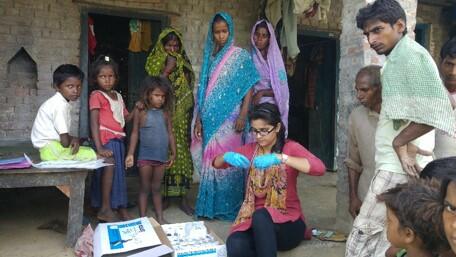
Researchers at LSTM have developed a simple dipstick test that can be carried out in situ to assess the quality of DDT-based indoor residual spraying (IRS) programmes for the elimination of visceral leishmaniasis (VL) in India.
VL, also known as kala-azar, is a major parasitic disease on the Indian subcontinent, with 85% of the disease incidence in India. It is transmitted to humans by the bite of infected female sand flies. As with malaria, IRS can be used to control and, ultimately, eliminate VL as a public health problem. However, in India, widespread resistance to dichlorodiphenyltrichloroethane (DDT), the insecticide used, combined with the lack of practical assays for IRS and limited entomological surveillance, is hindering the VL elimination effort.
A team of vector biologists from LSTM have developed a simple DDT insecticide quantification kit (IQK) for measuring the amounts of DDT being applied to surfaces during large-scale vector control operations. In a paper published in the journal PLOS NTDs they demonstrate that the IQK provides equivalent data to the gold standard high performance liquid chromatography (HPLC) which is the traditional, lab based quality assurance test.
Senior author on the paper, LSTM’s Dr Mark Paine, said: “Our study concentrated on IRS in India’s Bihar State and the data confirmed that the rate of DDT spraying was consistently below the recommended target concentration, confirming previous reports by LSTM’s Michael Coleman et al, published in PNAS last year. The availability of the IQK is an important step forward in enabling programme managers to report on the quality of their operations and its ease of use means that large numbers of samples can be processed on a daily basis. This information collected may be used as an evidence base for improving the VL elimination effort in India.”
You can read the full paper here.